Transcription
My Quest
by Daniel Labbe
Today's Quote: "Self-pity is our worst enemy, and if we yield to it we can never do anything wise in this world."
-Helen Keller
Today's Meditation - Warrior or victim, which would you rather be? The answer may seem obvious, but in the reality of day to day living many of us choose the victim role more than we would like to admit. When I write "victim" what I am referring to is that mentality that gives away its power by blaming other people, circumstances, and forces beyond its control for the problems it faces.
This is exactly the mentality that I used to have, and trust me, it did me no favors. Here's an example, "I'm an alcoholic, because I grew up in an alcoholic home. It's in my genes." "I lead a dysfunctional lifestyle because I grew up in poverty and dysfunction." "I hate my life because my job (friends, love-life) sucks." "I'm having a bad day because I was late for work, missed lunch-break, and had an argument with my girlfriend."
Do any of these sound familiar? I know that I used to use such dis-empowering logic on a daily basis. The problem with that kind of thinking is that it robs us of the power to do anything about it. We are now victims of circumstances beyond our control. I can't do anything about my childhood, my genetic make-up, what happened earlier in the day, or how other people behave; and if these things are what I'm blaming for the quality of my life then I am powerless to do anything about it. When looked at in this light no-one would willingly choose the victim's mentality, yet we all do it. Why?
One answer is that the reasons - the excuses - we use to explain our difficulties are actually true. It's true that I grew up in an alcoholic home. It's true that I was late for work. It's true that I've been treated unfairly. Not only are our reasons true, but it is also reasonable to believe that growing up in a poor, alcohol home would greatly increase my chances for being an alcoholic. That's a reasonable belief. And maybe the strongest reason we blame forces beyond our control for our problems is because it relieves us of our responsibility. "It's not my fault I'm an alcoholic." "It isn't my fault I'm having a bad day." These all make a strong case for the victim's mentality don't they?
But here's a perspective that is often overlooked: every situation has multiple truths and I can greatly affect my experience of that situation depending on which truth I choose to empower. The most well-known example of this is the "glass-is-both-half-empty-and-half-full" analogy. The weird part about this example is that both statements - the glass is half full and the glass is half empty - are opposed to each other; yet despite stating completely opposite conditions, both statement are equally true. That's kind of weird, isn't it.
[In Buddhism they speak of the warrior known as Bodhisattua - a mind-hero whose weapons consist of wisdom and compassion, and gives his or her life to the happiness and welfare of all beings].
So how does this apply to our daily lives? Here's another example. Although it is true that I grew up in a poor, often dysfunctional, alcoholic home, it is also true that I have the power to choose whether or not I drink. Both statements are true, but my experience will certainly be different depending on which truth I focus on. Here's another example. I live with an extremely difficult cell-mate. This could be a great reason for me to always be in a bad mood, agitated, and generally down and out. He really is a tough guy to live with, and all the other inmates keep asking me "how can you live with that guy?" How easy would it be to use this situation as an excuse to be in a bad mood all the time? But it is also true that I am trying to work on my interpersonal skills and hot temper. This being the case, having a difficult cell-mate is an amazing opportunity for me to come face to face with areas and skills I still need to work on. This is the perfect chance to really get some some inner-work done!
Now don't you think that my experience of the situation would greatly depend on which truth I choose to empower? In fact, it is this choice more than the situation itself that will determine my experience. That's empowering!
This is the attitude of the warrior. Warriors never blame forces outside their control for their experience of life, even when doing so would seem reasonable. Why would they? That just hands over their power and puts them in the victim's role. Warriors would much rather claim full responsibility for their experience of difficulties so they can be empowered to do something about it.
Even in tragic situations, warriors don't focus on the things beyond their control. Instead they focus their energy on their response to the situation. In any difficulty I find the following questions extremely helpful and empowering:
1. How have I contributed to this situation or my experience of it? (Taking responsibility for your experience and response).
2. How can I respond to the situation in a way that reflects my goals and values?
I don't care what the situation is, how unfair, tragic, or insane it is, these questions will help to empower you and help you deal with it in a much more effective way. It's true that we shouldn't have to ask such questions, especially when we are treated unjustly. But it is also true that these kinds of questions will help you heal, help you take control of your life, and help you respond to tragedy in a way that promotes health and healing.
There was a time when I lived in the victim's mentality. Growing up I was abused, at aged 15 I was diagnosed with a mental illness. I was an emotional wreck... and I blamed forces beyond me control for it. By doing that I became hopeless. How could I change those things. Such thinking made me a desperate person. Eventually my dysfunction and desperation led me to do things that hurt other people and landed me in prison. That's what the victim's mentality did for me. But once I made the choice to be a warrior my life changed.
I've been off of psychotropic drugs for over two years. I created and led a weekly mindfulness self-help group for 18 months. I became an active member in Toastmaster's and overcame my fear of public speaking. And I lead a life that reflects my goals and values. Today I'm able to do and be things I never dreamed possible for myself. I attribute this change mainly to the choice of letting go of the victim's mentality and choosing to live as a warrior instead.
My case may be an extreme example, but this applies to all of us, whether it's about having a bad day, being angry with a loved one, being stuck in traffic, or facing a tragedy the choice of victim or warrior is always before us, and it is this choice that will determine the quality of our experience and decide whether or not we have the power to create our own destiny.
Disclaimer: In no way am I denying that people are victimised nor excusing the offender's responsibility. The point here is about how we can each empower ourselves, how even if we are victimised we don't have to live as victims.
Remember the two questions to ask during any challenging situation:
1. How have I contributed to this situation or my experience of it?
2. How can I respond in a way that reflects my goals and values?
Other posts by this author
|
2016 aug 4
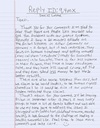
|
2016 jun 25
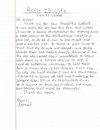
|
2016 jun 9
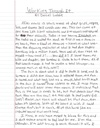
|
2016 may 5
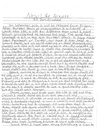
|
2016 mar 11
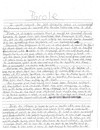
|
2016 feb 7
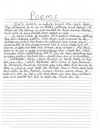
|
More... |

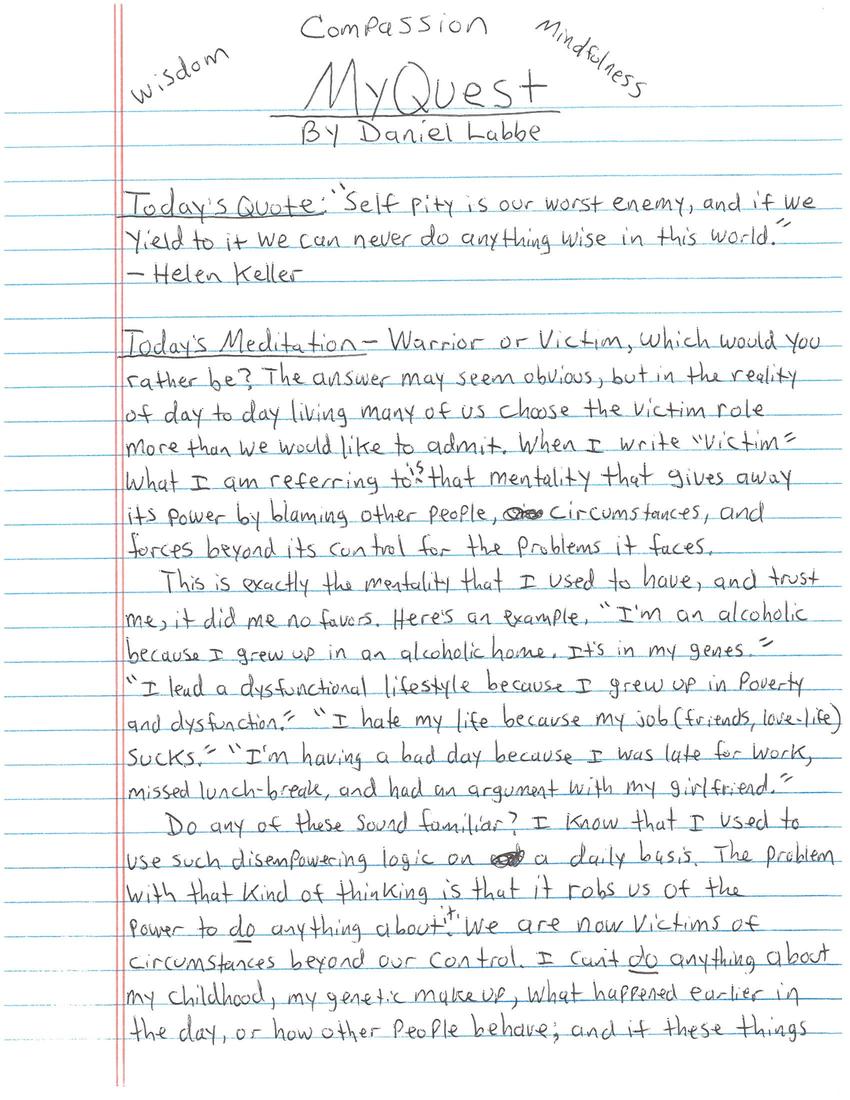
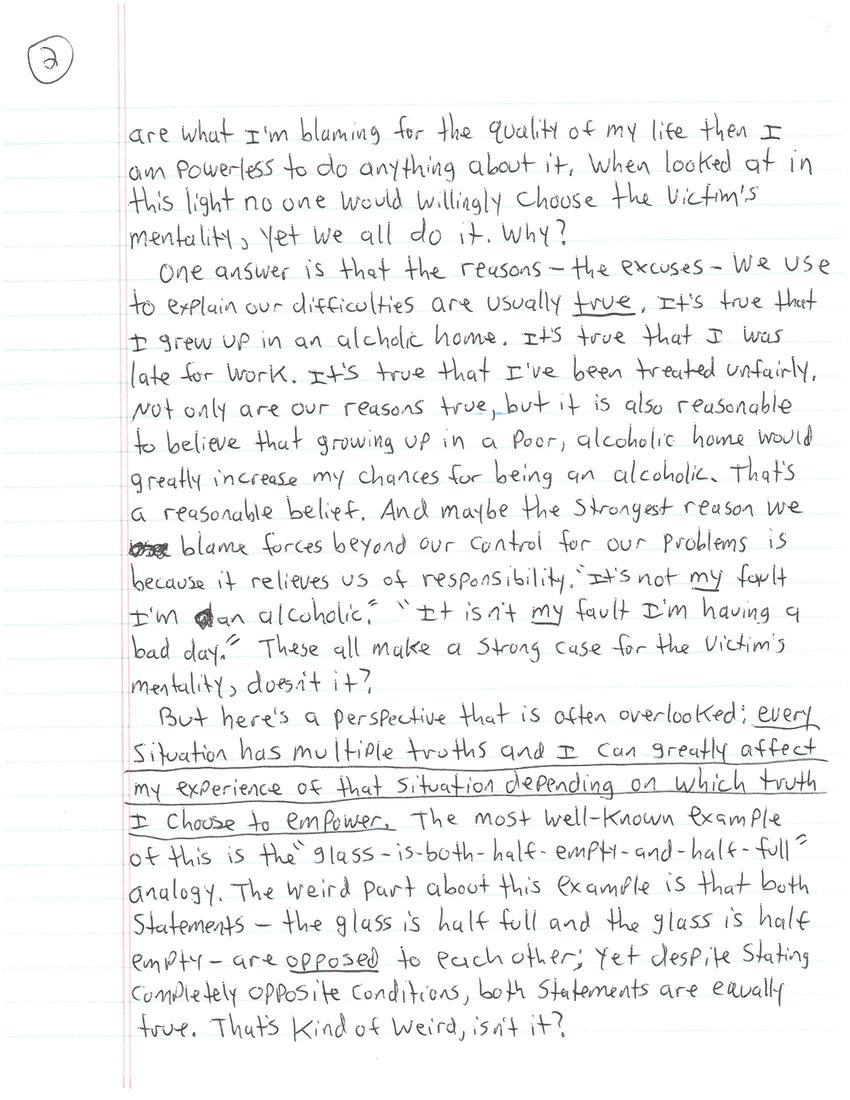
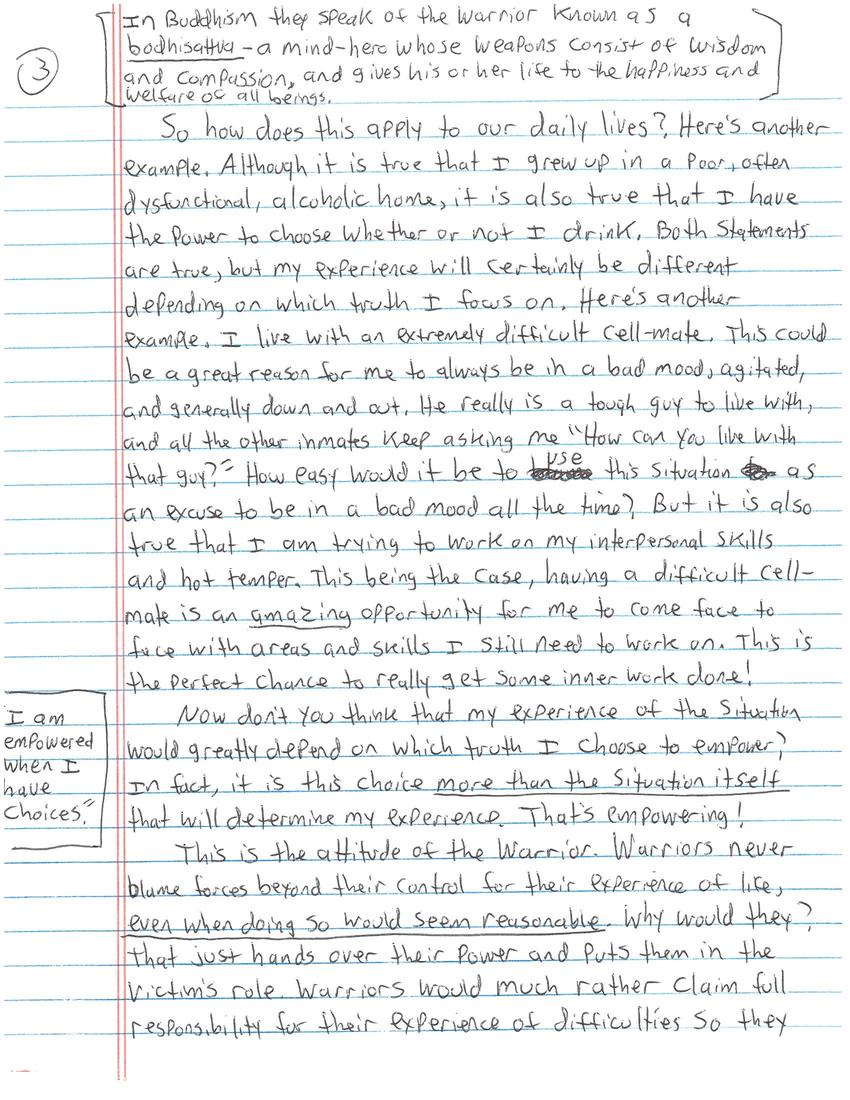
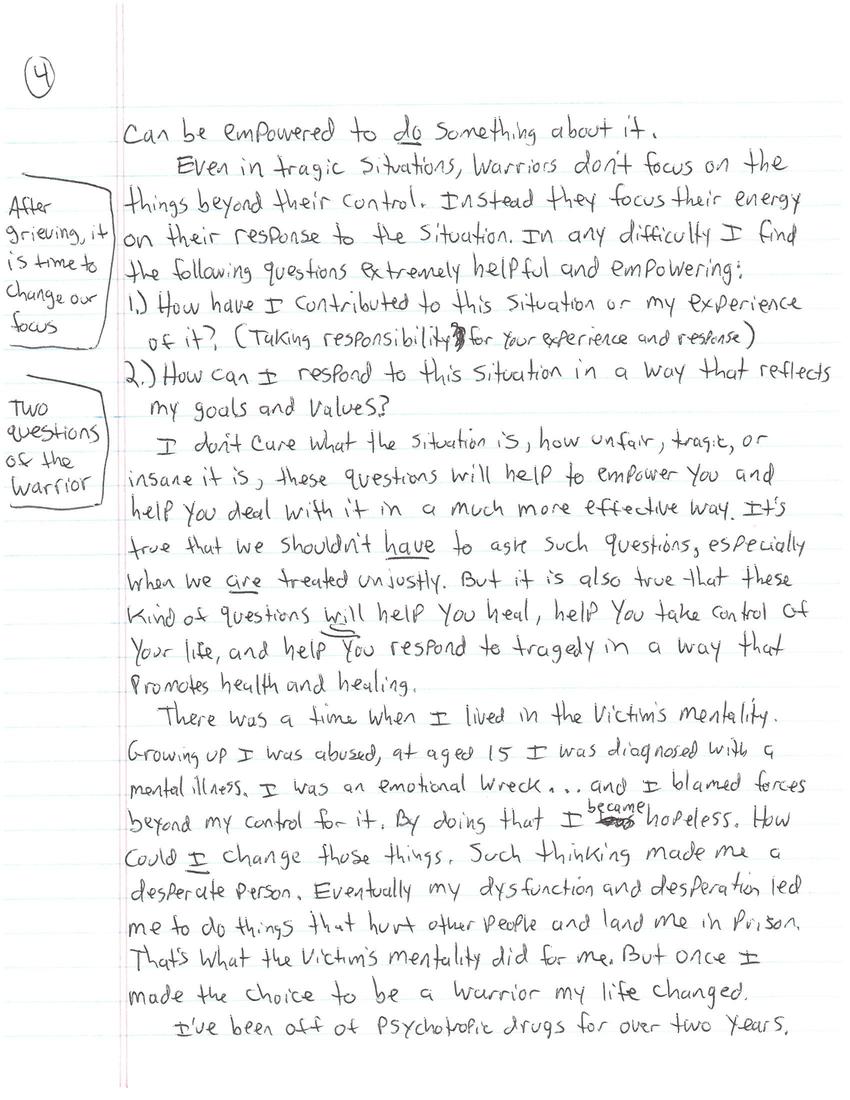
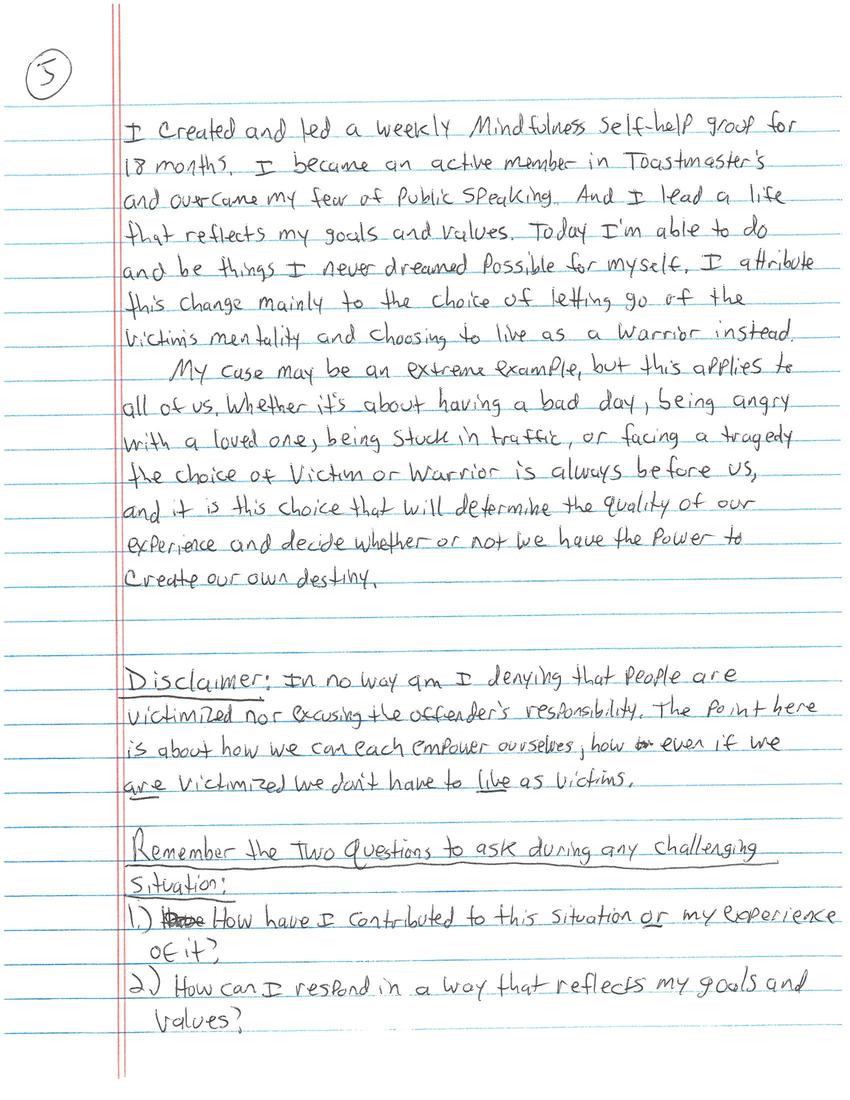

Replies (1)